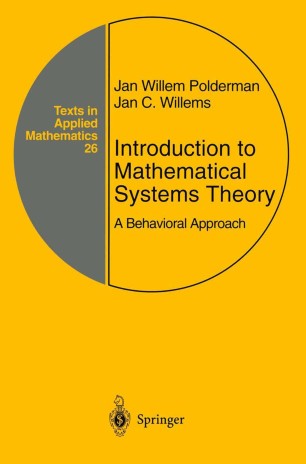Data-driven control
Vlastní kurzRecommended literature
The approach to data-driven predictive control that we cover in this lecture has its roots in the theoretical framework of behavioral (control) systems theory pioneered in 1990s by Jan C. Willems. The theory is presented in the monograph
-
Polderman, Jan Willem, and Jan C. Willems. Introduction to Mathematical Systems Theory: A Behavioral Approach. Springer, 1998.

Strictly speaking, reading the book is not necessary in order to proceed in the data-driven direction. The foundations for the data-oriented version of this model-based theory have also been laid by Jan C. Willems in
-
Willems, Jan C., Paolo Rapisarda, Ivan Markovsky, and Bart L. M. De Moor. ‘A Note on Persistency of Excitation’. Systems & Control Letters 54, no. 4 (1 April 2005): 325–29. https://doi.org/10.1016/j.sysconle.2004.09.003.
But these fundamentals have also made it to a book
-
Markovsky, Ivan, Jan C. Willems, Sabine Van Huffel, and Bart De Moor. Exact and Approximate Modeling of Linear Systems: A Behavioral Approach. Monographs on Mathematical Modeling and Computation 11. Philadelphia: Society for Industrial and Applied Mathematics, 2006.

A condensed (yet readable and sufficient) introduction is given in the paper
-
Markovsky, Ivan, and Paolo Rapisarda. “Data-Driven Simulation and Control.” International Journal of Control 81, no. 12 (December 1, 2008): 1946–59. https://doi.org/10.1080/00207170801942170.
The framework has recently been used by Florian Dörfler (of ETH Zurych) and his colleagues to propose a data-driven predictive control scheme. They call it DeePC (Data-enabled predictive control). Nice and concise overview is given in the presentation (slides)
-
Dorfler, Florian. “Data-Enabled Predictive Control of Autonomous Energy Systems.” 2019. http://people.ee.ethz.ch/~floriand/docs/Slides/Dorfler_INI_2019.pdf.
But a more detailed description is in the paper
-
Coulson, Jeremy, John Lygeros, and Florian Dörfler. “Data-Enabled Predictive Control: In the Shallows of the DeePC.” In 2019 18th European Control Conference (ECC), 307–12, 2019. https://doi.org/10.23919/ECC.2019.8795639.
I used both to prepare this lecture.
Some more recent (actually very recent) paper by Dörfler (apparently joining forces with Markovsky) on this topic is
-
Dörfler, Florian, Jeremy Coulson, and Ivan Markovsky. ‘Bridging Direct and Indirect Data-Driven Control Formulations via Regularizations and Relaxations’. IEEE Transactions on Automatic Control 68, no. 2 (February 2023): 883–97. https://doi.org/10.1109/TAC.2022.3148374.
Finally the topic made it to the popular IEEE Control Systems magazine as an overview paper
-
Markovsky, Ivan, Linbin Huang, and Florian Dörfler. ‘Data-Driven Control Based on the Behavioral Approach: From Theory to Applications in Power Systems’. IEEE Control Systems Magazine 43, no. 5 (October 2023): 28–68. https://doi.org/10.1109/MCS.2023.3291638.
Besides Dörfler, obviosly some other researchers who are investigating data-driven MPC also use the Hankel matrix based characterization of behaviors. The overview paper contains also some extensions towards nonlinear systems:
-
Berberich, Julian, and Frank Allgöwer. ‘An Overview of Systems-Theoretic Guarantees in Data-Driven Model Predictive Control’. Annual Review of Control, Robotics, and Autonomous Systems, 16 October 2024. https://doi.org/10.1146/annurev-control-030323-024328.
- Shang, Xu, Jorge Cortés, and Yang Zheng. ‘Willems’ Fundamental Lemma for Nonlinear Systems with Koopman Linear Embedding’. arXiv, 24 September 2024. http://arxiv.org/abs/2409.16389.